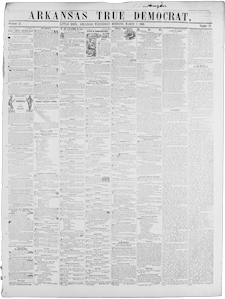[Little Rock] Arkansas True Democrat, August 25, 1860
In Camp, Lion Holes, }
20th July, 1860 }
Friend M.—In compliance with my promise on leaving Little Rock, I now write, being the first letter written by me since our departure. We are now in camp, resting our stock at this place, which you will find by consulting your map, is about 900 miles west of Fort Smith, and about 200 east of the Rio Grande. We have been out fifty-five days, and traveled about 1100 miles, in the heat of summer, and are yet between 600 and 700 miles short of our destination; and although we have had the worst season of the year in which to make a trip across the Plains, in every respect, in consequence of the great scarcity of water and grass, yet we have been extremely fortunate thus far, having lost none of our stock, and the whole company being in fine health and excellent spirits.
We now have passed, entirely, the Comanche country, and although during our passage we were continually reminded by the overland mail station keepers of the hazard and extreme danger of so small a party as ours attempting to cross the plains, yet we have made the trip without seeing an isolated Indian; and as our travels in this direction have not been the offspring of a desire for vain-glorious honors to be acquired by fighting these sons of the prairie, you may imagine we have lost less sleep in consequence of seeing none than the fear that we might possibly make an unceremonious acquaintance with more than would be healthy or profitable for our party.
We are now in the Apacha country, and have been, since we crossed the Pecos river. The Apaches bear the character of a subtle and treacherous race of Indians, pretending the most disinterested friendship, while at the same time they are secretly plotting your destruction, being totally different in this respect from their more brave and magnanimous neighbors, the Comanches, who, when they attack you, always give you at least daylight and an open field.
We have been thus far, extremely vigilant and watchful, always ready to receive the “poor Indian” in a warm and expressive manner, which, we hope, may not fail to express to the aforesaid “poor Indian” our appreciation of their considerate attention whenever it may be bestowed upon us; and while there are but seven of us, yet we can fire a salute of fifty-two shots upon the appearance of Mr. Indian without the trouble of loading.
We are all full of untried courage, willing, if needs be, to measure arms with any number of savages that may wish to try our nerve; yet our courage may, when the time for its display comes, (if it does come,) prove of no better material than old Jack’s, of sack drinking celebrity, for no man, I am convinced, knows what would be his conduct in the face of extreme danger, who has never been in that situation. That there is great danger to any number of white men encountering a body of Comanches at all superior in number to their own, all experience abundantly shows; for while they are probably the best equestrians in the world, and always fight on horseback, they are much better armed than persons in the States generally suppose; great numbers of them being armed with rifles and six shooters in addition to their inseparable companion, the bow and arrow, which, of itself, is no contemptible weapon in the hands of an Indian; being of as much efficiency as the six-shooter, because they can do execution with it at as great a distance as the majority of men can shoot a pistol with accuracy.
We have almost universally received at the hands of the employees of the overland mail company, kind treatment, and gentlemanly consideration; in fact we have met with but one exception, which was at the hands of the station keeper at the crossing of the Colorado, who refused some of our party a drink of water, which so enraged some of our number, that had it not been for the interference of cooler heads, he would undoubtedly have received rough treatment. This, I am pleased to say, was the only exception, which speaks well for the mail company and those employed by it. No one who has not traveled over the overland mail line can form any just idea of the magnitude of this successful enterprise, and the complete system necessary to its permanent establishment as a means of communication between the Eastern States and the Pacific. Indeed, I am convinced that it is one of the greatest achievements, as a coach mail line, that the world has ever seen, considering the extreme length of the line, (2,700 miles), the character of the country through which it passes, and the immense distance necessary to transport provender for stock, and the additional fact that during the whole time of its existence, but three mail failures have occurred on this line, and they were produced by high water. There are several “dry stations” on the line, to which water has to be hauled, in some instances, the distance of 25 miles.
G.
